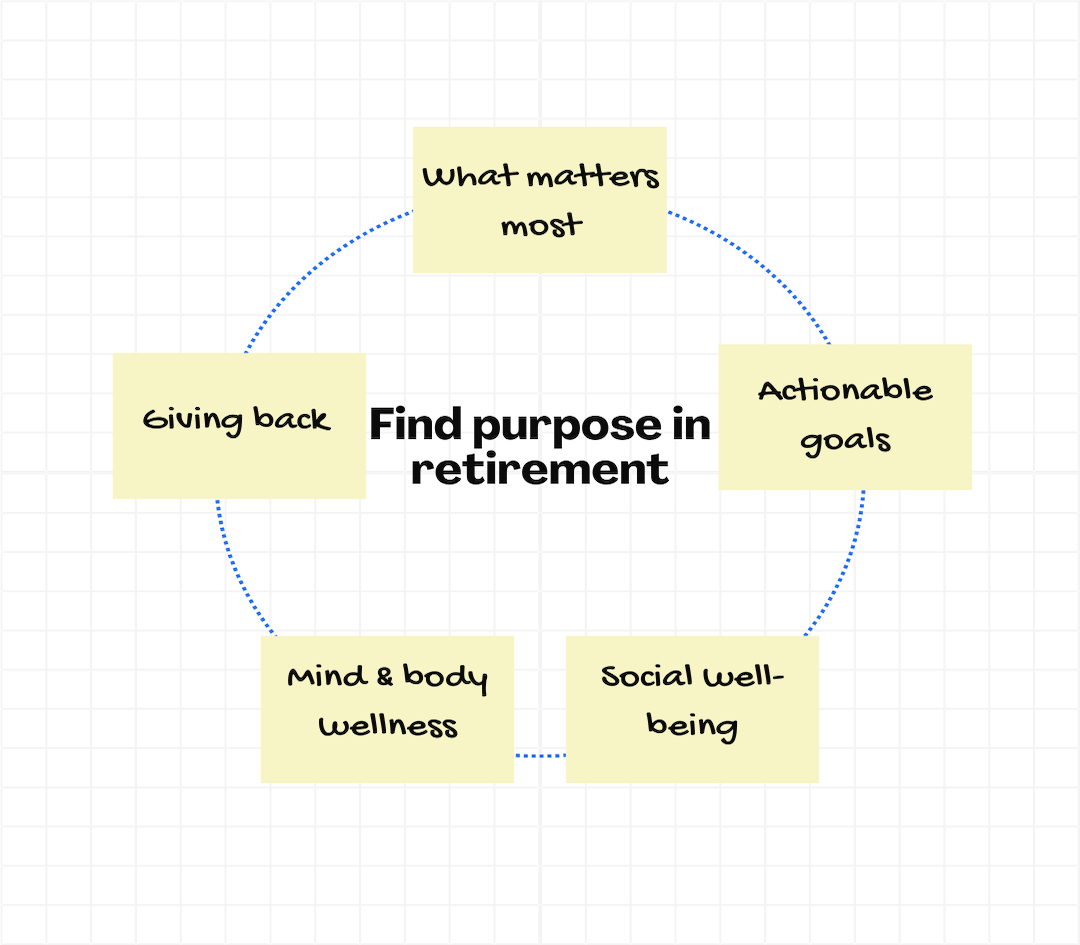Find purpose in retirement

Written by Vidya Kumar
November 27, 2023
What comes to your mind when you think of retirement?
- A time to sleep in without an alarm clock
- Freedom to pursue your interests and hobbies
- A sense of boredom and loss of identity
People look forward to new-found freedom in retirement, but once the initial euphoria fades, the satisfaction of retired life starts decreasing.
Retirement isn’t just about stepping away from work—it’s about getting into something new.
With longer and more productive lives ahead, financial security while important, is not enough. Also, just retiring one day and figuring out life after that may not be enough. How can we transform this phase of life into one with purpose, fulfilment, and joy?
Here are some steps to make your retirement meaningful and rewarding:
Define what matters most to you
Look inward to understand what matters to you. Ask yourself the right questions to uncover what makes your heart sing —Find out what motivates you to get up in the morning, what makes you truly happy, and what will make you look back and say, “I made a difference.”
Set actionable goals
Once you know your purpose and the kind of future you want, set goals to achieve it. Intentionally structure details of your purpose and interests. Goals that challenge you and help you learn and grow will enrich your life.
For instance, if your purpose is to help others in your profession, mentor professionals in your field. Conduct teaching sessions in your community, schools, and colleges on your topic of expertise. If you want to explore areas of interest like films or environmental sustainability, actively pursue them. Enrol in courses, attend seminars, and participate in workshops. Volunteer with environmental NGOs to help in tree plantation or urban farming.
Prioritize social well-being
The workplace gives many a sense of belonging and colleagues form an integral part of their social lives. Post-retirement, this social network vanishes, and retirees may feel disconnected and isolated, affecting their well-being.
Reaching out to old friends, rekindling family ties, or even making new connections can make a world of difference. You can even take up work for flexible hours and part-time schedules to be connected to others, get a sense of purpose, and earn money. For more opportunities to meet like-minded people and build a social network, you can be part of groups based on religious affiliations, schools, sports clubs, or musical associations like a band or choir.
Stay physically and mentally active
The absence of work routines, projects, and deadlines in our retired life may cause a lack of fulfilment and a sense of being lost. Creating new structures and routines is essential to stay physically and mentally active and remain socially engaged. Establish routines for the day, such as going to the laughter club or dropping your grandchild to school in the morning and going for a walk in the evening. Practice gratitude by appreciating life’s small joys—whether it’s a phone call, listening to your favourite song, or a sunny day. It can nurture positivity.
Give back
Retirement is an opportunity to make a difference in the lives of others and contributing to something larger than yourself. Whether through your time, knowledge, or resources, giving back is a powerful way to create purpose and leave a lasting legacy. Volunteer, mentor, or support causes you care about. If finances allow, consider establishing scholarships, donating to charities and institutions that align with your values. Even small acts of kindness, such as being the support system for someone unwell, can have a profound effect.
Your golden years are a precious phase of life—a time to rest, recharge, and rediscover yourself. While rest and relaxation are well-deserved, staying active within yourself and your community can add meaning to this chapter. Plan your retirement with intent, to learn, grow, and give back and make your golden years truly fulfilling.

